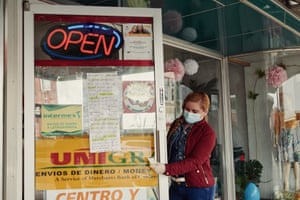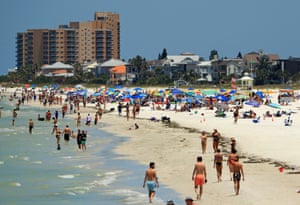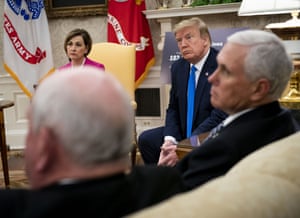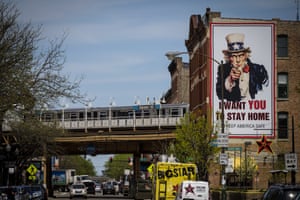‘You can’t ask the virus for a truce’: reopening America is Trump’s biggest gamble
With states opening even as Covid-19 rages on, the president is rolling the dice on his career – and tens of thousands of lives
- Coronavirus – latest US updates
- Coronavirus – latest global updates
by Ed Pilkington in New York
On Monday the Republican governor of Nebraska, Pete Ricketts, a close ally of Donald Trump and frequent visitor to the White House, opened his daily coronavirus briefing with a big announcement. “Today is May 4,” he said, “the first day of loosened restrictions statewide.”
With his declaration, Ricketts placed Nebraska at the vanguard of America’s reopening. Churches can now open their doors to worshippers, wedding bells and funeral dirges will be heard once more, hospitals can reschedule elective surgeries, and most Nebraskans will be able to resumehaving their hair cut, nails manicured, bodies massaged and skin tattooed.
Restaurants are once again serving diners, though at half capacity. Nebraska Crossing has become one of the first malls in North America to welcome back shoppers.
It’s a happy day in sunny Nebraska.
But the statistics paint a very different picture. In the last seven days, the state recorded a 57% leap in the daily number of new cases, to a total of 7,190. The death rate too is rising sharply, standing at 90.

Measured in Covid-19 cases per 100,000 population, Nebraska is wrestling with the worst outbreak of the disease outside the early hotspots of New York and the north-east, Louisiana and Illinois, all of which are now seeing the pandemic declining.
Nebraska’s lack of preparedness for the challenges involved in reopening is even more alarming. According to the Covid Exit Strategy, a group of public health and crisis experts with White House and US government experience, Nebraska is 49th out of 50 states in terms of its readiness for rebooting its economy.
It tests about a third the rate per capita of New York. By the time it started opening up this week, Nebraska has tested about 19 people per thousand of its population. Compare that with another jurisdiction with a similarly small population: Iceland.
That country has managed to contain the virus, largely by testing 151 per thousand, eight times as many.
“Opening up prematurely, which is going on in most states in the US right now, is only going to make matters worse,” said Eric Topol, professor of molecular medicine at Scripps Research in San Diego. “It will inevitably lead to more cases of infection, then intensive care patients, then deaths. Most of the lives we’ve lost so far have been unnecessary, so why do we want to add to that toll?”
Nebraska is not an aberration within the US – at least 42 states have begun easing restrictions. Many of those states are, like Nebraska, far from having the disease under control and insufficiently prepared to meet the challenges ahead.
Nor is Nebraska’s decision to reopen random or coincidental. It is the direct consequence of policy from the White House.

It is the product of Donald Trump’s latest – and arguably most breathtaking – gamble. He is rolling the dice not only on his own political life ahead of November’s election, but also on the lives of tens of thousands of Americans.
A day after Governor Ricketts heralded Nebraska’s reopening, Trump praised those states moving quickly to get the economy back up even while the virus rages on. The president decided not to wear a mask while touring a Honeywell factory in Arizona that makes the very masks that he declined.
In the background, the factory’s sound system blasted Live and Let Die.
Trump has been criticized for displaying a failure of empathy in his handling of the coronavirus pandemic, but even by his own standards his remarks at Honeywell were cold-blooded. “We have to get our country open, we can’t keep our country closed,” he said.
Asked whether reopening the economy too soon could have a cost, he replied with a euphemism for death. “Will some people be affected badly? Yes,” he said.
For the army of epidemiologists, health crisis experts, biostatisticians and other scientists who have hands-on experience of combatting global disease, Trump’s insistence on pressing ahead with reopening America while the virus is still ascendant is tantamount to waving the white flag.
“You don’t stop fighting a war in the middle, just because it’s gotten expensive or burdensome. And you can’t ask a virus for a truce,” Jeremy Konyndyk, a key player in the US response to Ebola in 2014, wrote on Twitter. Trump, he added, was “surrendering to the virus rather than fighting it”.
The US now has more than 1.2m confirmed cases of coronavirus and 74,000 deaths – vastly more than anywhere else in the world. By the end of this month the country is almost certain to pass the grim landmark of 100,000 deaths, and epidemiologists are already talking about 200,000 by late summer.
More disturbingly for those states now lifting restrictions, new analysis out this week showed that if you exclude from the data New York – where the number of new cases is now falling – the rest of the US is still on an inexorably upward curve.

Yet there continues to be a lack of urgency within the Trump administration in terms of its response to the crisis. There is no sign, in particular, of a federal drive for increased testing, without which states like Nebraska will begin to reopen blindfolded.
“It’s hard to understand the politics from the White House,” said Howard Forman, professor of public health at Yale University. “Why wouldn’t you prioritize the one lever that we know works – central coordination of a massive testing strategy? Yet that hasn’t been a national strategy in the US.”
Topol is equally bemused by Trump encouraging states to go ahead with easing the lockdown before safety measures are in place. “Most of the country went through mitigation for several weeks, with terrible economic consequences. Why did we do that if we are just going to abandon that strategy in defiance of protecting Americans?”
Topol’s frustration with federal leadership is heightened by what he sees as optimistic signs coming from science. A study suggests the antiviral drug remdesivir has promise in helping Covid-19 patients recover faster; experimentation is under way with monoclonal antibodies that might offer scope for treatment and prevention of the virus; and above all the race to find a vaccine is happening at a hitherto unimaginable speed.
“Science is moving at an astonishing pace and it’s all positive. We should be buying some time to let the science do its job – instead we are seeing the opposite: lack of leadership, chaos, deaths.”
As state after state scrambles to begin reopening, an especially thorny question has started to rear its head: what is the value of an American life? Andrew Cuomo, the governor of New York, expressed the thought most bluntly this week.

“The fundamental question, which we’re not articulating, is how much is a human life worth? The faster we reopen, the higher the human cost because of more lives lost,” he said.
Even Dr Anthony Fauci, the infectious disease expert who has been central to the federal Covid-19 response, addressed the subject. “How many deaths and how much suffering are you willing to accept?” he said, adding that states that lifted restrictions were “inviting a rebound”.
One reason that states like Nebraska may choose blithely to reopen, despite the risks, is that the impact will not be visible immediately. “It takes a while for a wave to build,” said Forman. “My guess is that where states reopen we are going to see the build of a wave sometime late in the summer that will start to be more and more scary.”
Topol agreed. “In the early days of reopening everybody is feeling great. The weather is perfect, people are congregating. Check back in a month and see how it’s going.”
There’s another reason for complacency about the virus – many people can’t see its ravages where they live. As the coronavirus crisis deepens in America, evidence is mounting that its impact is concentrated among certain racial and ethnic groups and elder Americans, often behind closed doors.
Though anybody is at risk from the contagion, the virus has rampaged through prisons and nursing homes and exacted an especially heavy toll in African American and other minority communities. “It is abundantly clear that this virus has not just exposed, but exacerbated, the deep, structural racial inequities that have been taking the lives and livelihoods people of color for generations,” the former Democratic presidential candidate Senator Cory Booker of New Jersey told the Guardian.
“The stunning health disparities we’ve seen with Covid-19 will not simply disappear as states begin to reopen – they will remain and get worse. This means communities of color will continue to face heightened health risks due to the president’s reckless and irresponsible guidance.”
The pattern that Booker describes is amply illustrated in Nebraska. Here, the pandemic is hitting hardest in the center of the state, where there is a concentration of meatpacking plants with largely immigrant workforces.
“People are afraid,” said Audrey Lutz, executive director of the Multicultural Coalition, a non-profit working with immigrants in the area. “Fear is pervasive. You have to provide for your family, you know a lot of people who are sick, you are maybe sick yourself, so what do you do?”

JBS Beef, one of the most stricken meatpacking plants, has had hundreds of confirmed Covid-19 cases but has stayed open after Trump declared meat plants to be “critical infrastructure”. Health authorities have struggled to keep a grip on the plant as an incubator of the disease, a job made next to impossible by the dearth of testing in the area.
Lutz said that the national guard was providing 300 tests a day for Hall county and the surrounding health district covering JBS Beef. At that rate it would take 12 days just to test every employee in the plant, let alone the other 80,000 people in the area.
“It’s devastating,” Lutz said. “The people in power are not affected by the decisions that they make. In our state, those people are white and privileged, while those who have to accept their decisions are minorities and immigrants – and they are paying a terrible price.”



